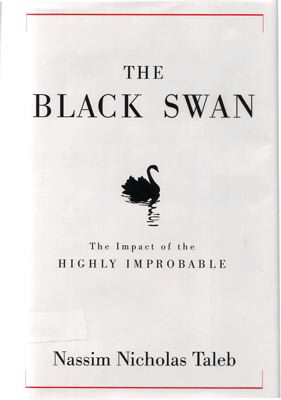No Light Rail in Vancouver!
Antiplanner Books #6: The Black Swan

“The Impact of the Highly Improbable” is the subtitle of this strongly antiplanning
book by a Lebonese-
The most salient example offered by Taleb has to do with investing: “In the last
fifty years,” he says, “the ten most extreme days in the financial markets represent
half the returns.” In other words, half the gains in the Standard & Poors 500 took
place in just ten days out of fifty years (roughly 12,000 days of trading). Thus,
anyone who says they have a sure-
If what Taleb says is true — and he offers a mixture of evidence from Chaos theory,
probability, and other mathematical fields — then any efforts to do long-
Unfortunately, I can’t recommend this book to people who think like me, in terms
of numbers and hard facts. Instead of focusing on such facts, Taleb presents a mixture
of autobiography, history, math, and fiction. He comes off more like an Ishmael-
A couple of glaring problems. First, he defines “black swans” as an event that is rare, has an extreme impact, and — while unpredictable — leads people to “concoct explanations after the fact, making it explainable and predictable.” But the metaphor of the black swan doesn’t fit. His inspiration is a story that Europeans believed all swans were white — until they got to Australia and found a black swan. Okay, that might have been unpredictable, but it hardly had an extreme impact on history.
Second, he devotes a whole chapter to the intimate details of an author, Yvegnia
Krasnova, whose book was a black swan — that is, it was rejected by numerous publishers
and then, when finally published, turned out to be a big hit. In the very next chapter,
he reveals that the story is fiction — there was never any such author. Yet he proceeds
to devote substantial parts of three more chapters to this fictitious author. Why
— when there are so many real-
So I fully agree with Taleb’s thesis, yet I find his method of presenting it to be
repugnant. If you liked Ishmael, you will probably find The Black Swan fascinating.
Otherwise, just remember the name “black swan” and use it whenever anyone says they
want to write a 10-
12
Trackback • Posted in Book reviews
Reprinted from The Antiplanner
